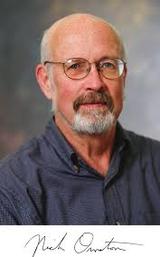L. Nicholas Ornston
Professor of Molecular, Cellular and Developmental Biology
 Nick Ornston, A.B., Harvard University, Ph.D., University of California, Berkeley, faculty member at Yale since 1969. You have been a leader in the study of microbial evolution by dissecting metabolic pathways and comparing gene and protein sequences for evidence of mutagenic events. A super sleuth, you have used the combined power of genetics and biochemistry to tease out evidence for DNA repair and recombination events leading to DNA sequence changes such as insertions, deletions, duplications and inversions. Indeed, your discovery of “slippage” during DNA synthesis revealed a remarkably simple means by which bacteria rapidly create genetic diversity. Along the way you discovered and characterized many of the steps in complex enzyme pathways in these organisms. Your detective work has given us fresh and rich evidence of how bacteria harness the versatile power of Darwinian evolution to adapt even to the most inhospitable environments.
Nick Ornston, A.B., Harvard University, Ph.D., University of California, Berkeley, faculty member at Yale since 1969. You have been a leader in the study of microbial evolution by dissecting metabolic pathways and comparing gene and protein sequences for evidence of mutagenic events. A super sleuth, you have used the combined power of genetics and biochemistry to tease out evidence for DNA repair and recombination events leading to DNA sequence changes such as insertions, deletions, duplications and inversions. Indeed, your discovery of “slippage” during DNA synthesis revealed a remarkably simple means by which bacteria rapidly create genetic diversity. Along the way you discovered and characterized many of the steps in complex enzyme pathways in these organisms. Your detective work has given us fresh and rich evidence of how bacteria harness the versatile power of Darwinian evolution to adapt even to the most inhospitable environments.
Those who have taught with you in your Microbiology and Biochemistry classes rave about your great lecturing skills and mentoring style. It would be difficult to enumerate all the many Yale trained doctors, researchers and others have you elevated with your knowledge of microbes and their amazing molecules. At the end of this sentence, all in this room will know one of your signature statements—that there are ten-fold more bacterial cells in or on our bodies than there are human cells!
In addition to being a key flag bearer for microbiology research at Yale, you have likely done more to shape the scientific texts and highlight key topics in this grand field than any single scholar in the last quarter century—which is the same timeframe you served as the Editor in Chief of the subject’s most influential journal Annual Reviews of Microbiology. Through all your efforts in research, teaching, and industry, you have helped spread the important concept that microbes are far more than just a few human pathogens—rather they sculpt all facets of all ecosystems on the planet. The renaissance in microbiology research and scholarship at Yale in recent years is a striking validation of your tireless service to this field. As you retire from active Yale service, your colleagues—now hyper aware of all the bacterial cells in this room!—applaud you and wish you well.
Tribute Editor: Penelope Laurans